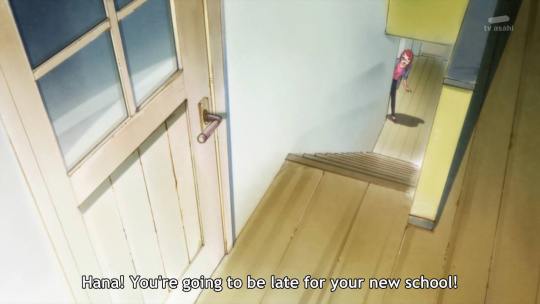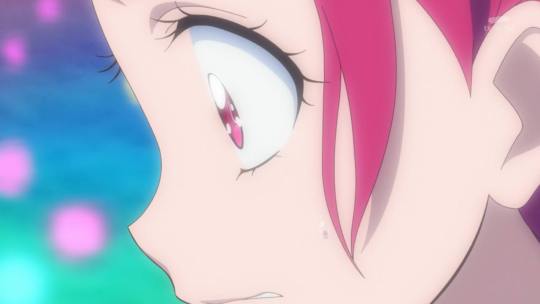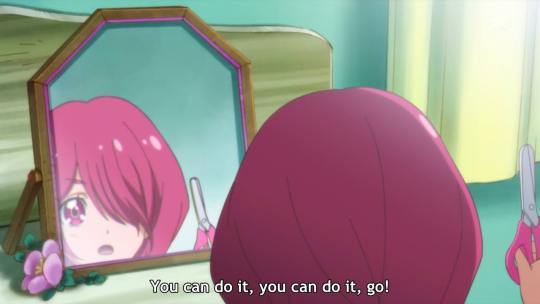#because of how allegiances constantly shifted around from season to season
Explore tagged Tumblr posts
Photo








RAVEN + CLARKE - "Hey, Raven? I'd pick you first."
#The 100#Clarke Griffin#Raven Reyes#Princess Mechanic#the100edit#Clarke and Raven are both fiery and passionate characters#so whenever they would interact#they would generate big and dramatic flares#making their relationship with each other a complicated one in the process#in addition to that#because of how allegiances constantly shifted around from season to season#it created an element of unpredictability in Clarke and Raven's dynamic#with them never really knowing where they stood with each other up until the very end#and that was fascinating to watch
493 notes
·
View notes
Text
“Hana is getting unstable” (A Pink PreCure analysis - qb)

If you follow the best and fastest Pretty Cure spoiler youtube channel out there, ToeiPrettyGuardians, you may notice that the uploader’s video naming sense can be a little awkward or blunt at times. In the below example, one clip’s title sticks out: “Hana is getting unstable”. You might think that’s an unusual take to have about 2 minutes of a flashy hero show whose audience are babies and you’d be right. That is weird, but it makes sense if you know that the currently airing season, Hugtto PreCure, has consistently upended expectations since it started, and operates on a level of complex storytelling that is impressive for any anime. It’s true that tv anime and particularly kids tv gets a bit of a free pass and has a lower threshold for quality given the difficulty of making it and documented history of poopoo garbage, but Hugtto PreCure has been something really special that deserves to stand among the heaviest hitters out there.

PreCure’s long history as a franchise is no stranger to mental breakdowns by villains, villains turned heroes, or even the heroes themselves. The turning of an evil character to a friend is usually accompanied by some degree of personal trial to justify the radical shift in their beliefs and allegiance. Last year, Cure Parfait’s brother Julio got stabbed in the chest and went into a transparent coma for months, and the slow breakdown of Eas around the midseason of Fresh PreCure, as she became more and more desperate until her lifespan itself was exhausted, is famous for being maybe the most brutal and stressful arc in all of PreCure.
youtube
The Cures themselves are annually brought to the edge of their personal hells, before ultimately overcoming them and reaffirming their mission as legendary warriors. The wrench that usually thwarts the baddies’ plans first is the indomitable spirit of whichever one is pink, the color that statistically sells the most toys, refusing to give up. Normally, PreCure will not end an episode on an upsetting development or twist, and as general rule will have a hopeful or heroic moment before the episode is over, barring season finales which can have more leeway, and as a final bastion of good times there’s always the sing-a-long ending themes. When Go! Princess PreCure devoted more than a single week to Cure Flora’s nadir in episode 38-39, it was a shocking turn of events that had never been done before, especially to a Cure that was so pink. Recently, Hugtto PreCure has flipped these trends on their head by ending episodes on brutal twists, skipping the normal ending song for the first time in 15 years, and through the characterization of its pinkest hero, Cure Yell.

Cure Yell, or Nono Hana, is an aspiring cheerleader of sorts whose future is limitless, and Hugtto PreCure starts on her first day at the school she’s transferred to. She immediately screws up cutting her bangs, but her indomitable positive attitude is undeterred as she runs to make friends at a new school. Through the rest of the season she becomes a PreCure, adopts a baby, meets new friends who also become PreCures, starts working at a store run by a talking hamster from another timeline, and gets an unneeded sword; broadly speaking, the usual PreCure stuff. Her main qualities are shown to be her invincible positive attitude, winning smile, and selflessly putting the support of her friends and family above all else. Hana will do her cheer for anyone, anywhere, including herself, when they need it most.

The first impression is that this is a silly and superficial trait, but it really works because of how direct it is. Hana will do her outwardly ineffectual “fure fure”, sometimes going as far as to turn her back on the monster she’s fighting, because what really matters to her is the motivation of the person she’s cheering for, even if what she’s actually doing might be useless and embarrassing. Hana has no doubt that the symbolic meaning of simply having someone in your corner in your darkest moment is far more real and important than these petty concerns. It hasn’t been explicitly stated why she believes in this so strongly, but recently, hints have started to emerge.


In episode 23, Hana was betrayed when some tall dude she talked to in the park sometimes named George was revealed to be the current President of Criasu, the corporation of villains from the future, and he abruptly steals the PreCure’s asu-power and stops time for the entire planet. Cure Yell was able to move in the stopped time and save everyone after hearing her magic baby Hugtan crying for help, which is honestly the expected development for PreCure, although it’s very well executed. What diverges from expectation however, is that Hana was reminded of her own mother in that frozen moment.


Although Hana’s flashback is unclear on details, what can be inferred is that Hana was bullied at her last school, became introverted and depressed, then her mother did something drastic to help her, ultimately affirming that Hana’s future was limitless, which prompted a shift in Hana’s personality. This allows her to do the same thing to save the baby that relies on her, and do something drastic to protect her future. Given the state of Hana’s bangs in this flashback, we can more or less put together where this fits in the timeline, right before the start of the show. This revelation changes how significant certain throwaway lines were in the premiere, like Hana wishing to change her image, Hana transferring in the middle of a school year, her mother starting a new job, and the Nono family moving. Even a small detail like a gag about 20 yen eggs and “the Nono family’s financial peril!” starts to make more sense if you assume that the Nono's have just moved to get Hana away from a bad situation.

The implications that Hana’s current extroverted, positive outlook is a consciously maintained effort to inspire others, but also to keep herself stable, and that she’s constantly aware of how easily she could slide into depression again, are complex narrative threads that span the entire year, coloring Hana’s development and interactions before and after, not just within a single episode. Hana’s emotionally lowest point has not come yet, but the trauma of her last encounter with George is starting to show in her behavior, and it’s breaking down her determination in a way that her mother’s support alone might not be enough to fix. With all this in mind, it’s not inaccurate to say Hana is starting to lose the conviction that was keeping her stable.



This level of storytelling is impressive in its own right for any anime, before factoring that it’s in a presumably monster-of-the-week show, and in a kids franchise as rigid as Pretty Cure. By placing moments throughout multiple episodes before an explicit reveal of what Hana’s mother did to save her, Hugtto PreCure naturally builds to an emotional episode that we know is coming, and it will hit that much harder because of the writers’ extensive groundwork. Although it is a miracle that Hugtto PreCure has been able to gather this much talent at a busy studio like Toei, it’s no lucky coincidence that it has been able to hit on so many emotional levels so consistently; they’ve been putting the work in the whole time, since before you knew it was happening. Even if the writers go with the expected route, and Cure Yell is able to overcome her fears thanks to everyone she’s ever cheered for returning the favor, it will feel extremely earned due to the steps they’ve taken to concretely show just how far Hana has come, and the episodes that have subtly invested in her rare moments of weakness.



👀 bottom right oof
-magical girl anime reporter qb @queuebae on twitter visit my web page at urahara.party
#hugtto precure#hugtto precure spoilers#precure spoilers#hugtto#pretty cure#precure#hana nono#cure yell
227 notes
·
View notes
Text
Isaiah 1-10
No offering at all is better than the proffering of an insincere one. Or so Isaiah's words would lead me to believe. A disingenuous faith would seem to disappoint the Lord more so than the soul that has no belief in the first place. Is that correct? Verse 15 details about the Lord hiding his eyes from the selfish believer that more than anything else seems to be using his posture to take advantage of God's extended grace. And perhaps that heart is even more hardened, certainly more deceptive, than the heart that still has room to be shaped.
The Lord, through Isaiah, tells us to stop doing wrong and to seek justice. And the question remains, what constitutes an empyreal justice? Defending the oppressed, advocating for the fatherless, rooting for the widow. Who better the examplar of demonstrating these methods of justice than Jesus so many years after the prophet's words were spoken and shared. There is an emphasis on obedience, once more, as a central tenet of our place as members of His Kingdom. And finally, a picture of the fate of the one who chooses to dwell in the things they believe are best for them. Point blank, destruction for the rebellious nation that repudiates the Lord. What I'm trying to see is the justice in God's wrath, which I know should be undeniably warranted, but it's still confusing to me because of my own fragile human conception of it.
~
Men, whether spiritual or unspiritual, are full of arrogance. Our accumulation of wisdom causes us to think we know best. But when God is in the picture, how could we claim any authority over anything? When confronted with Justice Himself, what could I possibly bring to the table... we say, Lord please humble us, but do we really mean it? Why is it easier for me to trust people I can see and touch, than a God who operates in mystery? And I'm to be reprimanded if I don't, or so I'm sometimes led to believe by those same people clamoring for my trust.
~
The Lord threatens to strip Jerusalem & Judah of men of clever rank and capabilities, of leaders to steer either nation out of the ditch. But why this oppression? It seems warranted based on their blatant disobedience and overall defiance. There is no hiding their sinfulness. In fact, the people that Isaiah is preaching to seem to boastfully parade their sin like some kind of badge of honor. But you know, I couldn't be too unlike these Sodom-like folks. How many times do I blame the circumstances around me for my continued tangle with sin, instead of recognizing that my mere existing is just as much a targeted reason for blame, if not even more so because I'm so naturally pointed inwards? Yikes, this is getting a bit tiring to constantly put myself down. It still seems hard for me to reconcile the sinfulness that makes me obviously wicked with an all-encompassing love that redeems that same deviltry. How can I be eternally unworthy, yet simultaneously instilled with worth in perpetuity? I can believe that to be the truth, but that doesn't mean I still don’t get fuddled up every now and again, either by provocative yet sensible arguments piercing my heart inwards or from the inner turmoils of my own lingering unbelief.
~
I get that the sense that this transition is meant to point to a larger nature of hope to believe in. The Branch of the Lord, a seemingly symbolic appellation for Christ, is it not? There is purification (hints of baptism?) mentioned, and references to clouds of smoke and pillars of fire. Perhaps these images are included to reinforce the image of an authoritative and dynamic God... is there any other significance in these verses?
~
It isn't too difficult to surmise the essence of the parable; there being certain blessings and care sowed unto the Israelites, their disappointing Him, and their rightful and deserved ruin. And it seems to originate out of us and our imperfectness, rather than Him placing any kind of deceit in our hearts. So is the design faulty? I'm still not sure how to answer that, considering the Creator's intentional attention to detail.
My heart still clamors to understand the justice of God. By all accounts, it should be in and of itself objectively just. There must be more to God's detestation of sinners than just their act of transgressing the Law or the Word. The justice of God is so appointed, and so worthy of reverence, because it is a necessary vindication on account of his holiness and authority. And so all these woes that point fingers at the deceitful transgressor seem to highlight the importance of God's "anger not turning away." There seems to be a time to talk about grace, without leaving out any conversations about His necessary justice.
~
Isaiah's eagerness seems prompted out of awe, yet at the same time dread. We get a glimpse of God's magnitude in the description of His robe filling the temple and in the seraphim's chant. Why does God instruct Isaiah in the ways that He does? I can certainly understand the telling of these outcomes as consequences to the Israelite's sinfulness, and yet God seems to want to preclude those same Israelites from turning away from their self-righteous judgments and towards any kind of healing. Does God just want to give up the wicked man to his own blindness because they aren't inclined to receive the truth in the first place? Maybe He knows the stubborn heart better than I do... still, it's hard to see the mercy in this holy requisition.
I guess even if the cities burn down and the land becomes forsaken, there will remain even just a few seeds out of the crowd to be sowed and reaped. But I wonder if that purging of His Kingdom is meant to come across as so exclusionary, or if that's just my personal myopic conception of it. There's a lot of eschatological underpinnings in this particular prophecy, yet I also wonder if I might be reading too much into it..
~
I remember Ahaz... what a wicked guy. The only reason Judah wasn't trampled over was because he chickened out and pledged allegiance (+ gold) to the Assyrian king Tiglath-Pileser. I read God's words to Ahaz through Isaiah more as an appeal for Ahaz to find some sincere belief in his heart for the Lord's providence rather than in foreign kings and nations. Essentially, like God's saying "when you are in the depths of your distress, or even at the peak of confidence, find some room to see Me in the landscape of it all." But Ahaz sharply refuses; his belief is shaky from the start, and this unwillingness to commune with God affirms his stubborn heart to see things from his own shortsighted platform.
Assyria's conquest of Judah and the subsequent settling of scattered Israelites in the regions of Samaria comes with years of foreign oppression; and Assyria is depicted as the Lord's "instrument." So was this all intentional on His part? To bring his people into an extended period of misery, perhaps to teach them a lesson? What an unconventional way to do this, considering the nature of God we've painted for ourselves in our contemporary church.. yet somehow this all fits into His framework of divine justice.
~
Isaiah's talking about the inevitability of mankind's doom, probably on account of their sinfulness, comes across as simultaneously hopeful but also hopeless.. hopeful in the sense that we have been given a decent heads-up on the darkness and gloom that accompanies living apart from God per our own selfish ways, but also hopeless because it seems an already predetermined fate no matter what we could do in anticipation of it. Is that sensible?
The question arises again on if I am willing to believe in the face of adversity; can I still remain "firm in my faith" when the crowd around me advises otherwise? It's a choice between light and darkness, and it seems quite straightforward a choice, even elementary. But when the human heart realizes the sacrifice that comes along with making that choice, there begins the inception of unbelief... Jesus epitomizes sacrifice on behalf of people outside of Himself. I wonder why it's so hard for me to do the same.
~
The famous words, echoed every Christmas season: "For to us a child is born", and so on... and in the context of Isaiah, it accentuates this transition from darkness to light, this marked ambition to hope in a Greater Perhaps. Jesus' coming promises a codification of a holy peace and justice and righteousness.
And then, a further highlight of this objective justice and righteousness is manifest in the Lord's wrath. It's the everlasting subject of scrutiny to members both inside and outside of the church. What is our justification for God's wrath being just? Is any wrath truly just? Well, what is the object of that wrath... foolish and ungodly humans that devour each other without second thought. Does community mean anything, if we are so quick to throw it away to indulge in our own biases?
The mantra "His hand is still upraised" continues to ring.
~
The Lord is just in singling out Assyria, by Scriptural context His agent in instrumenting Judah's demise, for its grandstanding predisposition in elevating itself and its political prowess as being sourced from its own intrinsic capabilities as a foreign self-ruling militaristic nation. Within a contemporary framework, I find this commensurate to pompous self-proclaimed religious folk waving around their invisible badges of moral superiority in essence motivated by the willful prides of their hearts. This localized tumor of Christian attitude is hardly anything new. But what's interesting is Isaiah's talk of what remains of Israel following God's assured judgment.
A shift in reliance from the men and women we intuitively raise up (or desire to see knocked down) to the Holy One of Israel. Any kind of judgment and correction hurts. But in that brief duration of suffering and confusion, the Israelites are granted deliverance from their oppressors. If I am willing to endure, can I too look forward to my emancipation from the heavy-handed subjection of sin?
1 note
·
View note